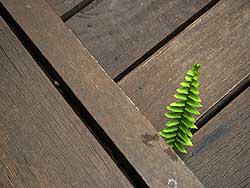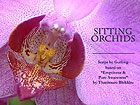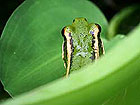
|
|
Returning the sacredness to lifeby Vasana Chinvarakorn, Bangkok Post, Jan 28, 2006
Bangkok, Thailand -- A pot plant had been placed in a prominent position in the middle of the classroom. It was a ngern lai ma, a rather unprepossessing decorative plant but one believed by Thais to have auspicious qualities. Everyone kept their eyes closed, ears straining to pick up the teacher's instructions. "Relax," the old lady said very softly, then paused for a moment or two. "Relax even more deeply." Slowly, she guided the whole group into a meditative state, urging them to keep their minds alert, joyful and ready for the great task ahead: Tuning into the "spirit" of the plant.
The teacher smiled, laughed. But soon she proceeded to expound on their experiences and to correct their (mis)understanding. No, she told them, an authentic spirit wouldn't complain about being trapped in a small pot. Nor about its branches being constantly trimmed. On the high plane of existence, where, she believes, the "intelligence" of this species of plant dwells, there is no judgement, no dualistic distinction between rights and wrongs, likes and dislikes; no personal preferences. Only a boundless, inexhaustible supply of love. Dorothy Maclean's class, the first workshop of its type ever held in Thailand, placed a lot of stress on that last quality. Despite the physical and cultural distance separating her homeland from that of her pupils, this Canadian octogenarian, one of the founders of the Findhorn Community in northeastern Scotland, seems to have a lot in common with the very root of Thai customs, with a tradition that cherishes Nature as the supreme mother of us all, the epitome of immeasurable generosity. "This plant was [initially] very tentative; it's not used to having people communicate with it," said Maclean, elaborating to her students - all farmers from the locality - on the "message" she had received. "Nevertheless [the plant] likes it. Cooperation between plants and humans is the way for the future [says the spirit]. For, together we can choose what's best for us and best for the world. We can enhance each other, plan together and make our garden a wonderful example of producing the best possible for all concerned." In this age of mechanised, chemical-assisted farming, Maclean's mission is poignantly non-mainstream. It's about returning the "sacred" aspect to one of mankind's oldest professions. Agriculture shouldn't be about squeezing the maximum possible from the land, water and air, she holds. Rather, it should be viewed as a path toward (re)discovering one's own essence, what Maclean calls "the God within", the marvellous world of beings and non-beings that surrounds us and that tries to direct us towards mutual respect, cooperation and peace. Some people might sneer at her endeavours, even dismiss them as pure pagan acts. (Maclean burst out laughing when asked whether or not she saw herself as a witch. "No, but I might look like one if I was wearing the hat!," she quipped.) Others may ask sceptical questions about her methodology: How do we know we're not duping ourselves? Where does one draw the line between hallucination, imagination and truthful communication? At the other end of the scale are purely utilitarian concerns: Can we ask the spirit of rice, say, to bless us with unprecedented bounty, perhaps 2,000 kilogrammes of paddy per rai? Then we wouldn't have to tamper with genetic codes, would we? Maclean's scheme of things goes beyond individual interests. It drives straight to the essential heart of the issue - the well-being of our planet, of the universe. From plants, she moved on to communicating with other deva, a Sanskrit term she borrowed to connote the idea of a particular flow of energy that looks after each living species, every single rock, mineral, village, city, country. Were it a cult, there'd be no leader, no props, no rituals. "God", "angel", "divinity" are terms she uses interchangeably as approximate descriptions of that intangible, formless force. Even her own understanding continues to evolve, she said, "expanding" from her first discovery of "God" half a century ago right up to the present day. One of the ways to confirm whether or not a "message" really has come from a higher intelligence is that its content be something totally "unexpected", Maclean added. To prove her point, she repeated what she had heard during her initial encounter, on September 26, 1970, with the mighty energy of what she refers to as the "Cosmic Angel of Stone": "Yes, I whom you have contacted am concerned with vastly more than your planet, for I contain or am connected with mineral life which exists in various stages throughout creation. Nature is full of paradox, in that, as you seek contact with what you consider a lower form of life, you in fact contact a more universal being. The human mind codifies and formulates, which is within its right and purpose, but forgets that all is one, that God is in all, and that the basic substance of life, which seems most devoid of sensitive consciousness, is held in its state of existence by its opposite, a vast consciousness, too vast for you to do more than sense its fringes and know that I extend beyond your imagination as yet. You realise, too, that dense matter is influenced in its make-up by stellar energies. "It was the beauty of this particular stone which drew you to me. Beauty is of God, beauty is working out in all levels of life. Consciousness of beauty brings you into oneness, into any part of the universe. You are contained in it just as I seem to contain universes within myself. The more you appreciate beauty, the more you are linked universally. It is good to seek the life of it on high levels, for then your consciousness is expanded. "You feel right now that you can only look at every pebble with deepest reverence and worship, because you know it is part of my vastness. We are glad that in this way you have been shown a very little of the glory of God. The glory of God is everywhere, stretching from the farthest reaches of the universes to the little grain of sand, one and the same thing, held in eternal love and timeless with life. "Yes, of course it would be good to tune into me if you work with stone. [Have] reverence [for] all life, emulate my patience, unfold the mysteries of God and even of pebbles. Do it as a learner of life, a revealer. Let your dominion be over yourself and let your expanding consciousness see God's life in all things, where indeed it is, and, as you have learned, in the most surprising things. The colour and sparkle of a stone is wonderful, but more wonderful is [the] consciousness which has brought about, and brings about, these outer manifestations and grows cosmically. We are all part of the one life, no higher or lower. Praise God forever in the vastness of all life." More surprises were to follow. The learning process was akin to that of a child always discovering new wonders about the world. But Maclean's endeavours were never meant to be an esoteric pastime for the superstitious. She said she came to the slow realisation that there was an urgent need to preserve ancient trees ("mature trees do not only have the seeds; they seem to have wisdom that comes through them," she emphasised - see the message from the Copper Beach Deva on page 8) and that the spirits of urban areas desperately need human cooperation and love, too. "The angels, or at least those in North American cities, probably have the worst job on the planet," she joked. "I realised that I myself had made the job of the angel of the city more difficult. I had used the city - I'd go there to do shopping, go to the movies, museums and then get out as quickly as I could, hating it, not thanking it. "So this connection with the angel of the city completely changed my views of the modern world. [Later on] I landed up in a large city named Toronto. I live downtown, up on the eighth floor [of a building], and I have no problem [with that]. I joined a group [that works] to beautify the city. Since then, I've had no problem being in the city." Maclean's reconciliation with the hectic, bustling pace of modern life is but a step away from returning to her first home, Canada, after three decades of absence and the discovery that her country of birth also has its own guardian angel. Given its largely unspoiled nature, the angel of Canada reflects that quality, Maclean noted. Unlike its superpower neighbour to the south, the communal spirit of the Canadian people believes in freedom through government, not the totally laissez-faire state espoused by many Americans. All in all, country spirits are of the benevolent kind, she said. In this globalised world of ours, to acknowledge collective identity without overt pride and "not to tread on another's shoes" is crucial. War is a creation of human beings, not angels, she added, and when conflicts arise, the assembly of neighbouring angels try to make the best of a given situation. The very last story Maclean shared with her Thai-farmer students that day was about how a growing segment within the scientific community has started to recognise the value of communion with nature. A few years ago, she said, a female researcher from the US Environmental Protection Agency thanked her for her contributions in this area. Why? Well, after days of futile attempts to collect species of living creatures on the bottom of the polluted Puget Sound, the scientist prayed to the "intelligence". The very next day she was able to gather exactly what she had been looking for. Her request had worked. "What I [learned from the episode] was that we [nature] want to help out with whatever, but you've got to ask [first]." A sentiment that seems to echo that taught by many religions: Seek and you shall find. For Maclean, striving to become one with nature is a wonderful process, for humans will not only achieve closer cooperation with plants, or any other being for that matter, but, more importantly, they will realise "how to live every aspect" of their lives, too. And that's good to know, isn't it? 'You have need to feel the steady strength of our flow of force. All of you can gain much by partaking of our balancing flow, especially at this time when people rove a changing land of lost values. All life needs a firm foundation, and our radiating strength can evoke in you a similar force which is too often dormant. "You have touched on yet another reason for the need of large trees. We channel a type of force that has a steadying influence on life. Truth tells you to build your foundations on rock, on God, this is what we do and what we unconsciously remind you to do. "Humanity does not realise that among other things, their natural environment is full of forces that correspond to, and therefore can bring out, some of your own make-up, and that you are influenced by the environment in many subtle ways. Here too, the great trees have a mighty part to play and you are bereft of some part of yourself, and of your heritage, when you denude the land of large trees. "Now come close, resting in our strength and becoming aware of the smaller notes that we play, aware of the flutter of leaves, the bright sheen of colour, the sunshiny softness of spring, all connected in some way with the birds, the insects, the elements. A large tree is a family, a home, a county to explore, and a place of beauty. It stands, giving out to all and sundry, a refuge for many. It stands proud, reaching to the sky and deep into the earth, enduring. It stands as a symbol of a particular perfection of God. Let it stand and you will come closer to God." - Copper Beach Deva (May 22, 1970) This may sound strange, but organic farmer Raweewan Srithong had always hated millipedes. The mere mention of its name would send a shiver down her spine. The sight of one? Immediate flight. For some strange reason, though, during the entire course of the workshop led by Dorothy Maclean in Chachoengsao, where Raweewan learned how to communicate with the "intelligence" of nature, she sensed hordes of these creatures swarming around her. On the morning of the final day of the workshop, she woke up early and decided to take a walk alone in the woods. The air was fresh, the atmosphere peaceful. Then she spotted a millipede a few metres from her feet. "During the workshop, I couldn't see or hear anything. Only the feeling of calmness," Raweewan said. "But at that very moment, I decided to collect myself, and radiate good feelings [toward millipedes]. Then I heard something. I don't know how or where the voice came from, but it certainly didn't come from my head. "It said, 'Why do you hate me? I know you wouldn't swat a mosquito even if it was biting you. I know you're not scared of scorpions - and they're poisonous. Don't you know I'm very useful to the world? Come closer to me.' I took a step forward. The voice continued. 'Come closer. Closer. Sit down. Touch me.' And I did exactly that." Whatever caused it, that episode cured Raweewan of her primal fear. If it was a hallucination, at least it was a good one, she said with a laugh. Nattaros Wangwinyu, who served as an interpreter for a separate workshop by Maclean in Chiang Mai, said it would be hard to tell whether the messages are our own voices, or theirs - the urgings of "intelligent" beings. Perhaps they are both. Or perhaps fundamentally there is no distinction between us and them. The voices could have been those of relationships, a joyous mingling of humans and their surroundings, he said. In retrospect, Maclean's arrival to teach Thai people about the value of Mother Nature seems ironic. Hasn't respect for the three "mothers" (mae) - the earth goddess (mae pha thoranee), the water goddess (mae pha khongkha) and the rice goddess (mae phosop) - long been entrenched in our culture? But in practice we end up polluting all three - and discarding the belief in them as a superstitious practice of yore. Daycha Siribhatra, an advocate of organic farming, therefore decided to invite Maclean to show organic farmers, members of the Sustainable Agriculture Network he's been working with, how to re-connect with the myriad of natural beings. After a few months of preparation, which saw the publication of a book in Thai (see endnote) about her, Maclean and her assistant, Judy McAllister, took up the invitation. They even declined tuition fees, accepting only enough money to cover their travel and accommodation expenses. During their one month of travelling to different parts of Thailand, Maclean and McAllister said they sensed a feeling of joy, compassion, and ingenuity in the devas (see main story) that protect plants, animals (the creature of choice during their workshop series was the water buffalo) and people. The challenges are how to react to the onslaught of rapid change, how to marry modernity with long-established traditions. But there is huge adaptability, added McAllister, and the successful blending of the old and the new may be a legacy that Thailand could pass on to the rest of the planet, she said. To compare and contrast Maclean's approach to Buddhist teachings may not be possible. The meditative state she espouses, where one stays alert and awake while tuning in to a higher intelligence, sounds a little like the cultivation of mindfulness by Buddhists. Nipatporn Pengkaeo, an author of books on travel, local culture and spirituality, noted that the process is not unlike the vision quest practised by some aboriginal people. Buddhism, on the other hand, does not recommend that meditators hold on to any sensation, any mental image, however desirable that may be. Nipatporn said she had had some remarkable and unexplainable insights during the leg of the workshop series held in Suphan Buri. For example, while tuning in to the spirit of an orchid, she had been told facts about it which subsequently proved to be accurate. The focus on reconnecting with the divine within also enhanced her years of meditation practice, she added. It is difficult to foresee whether or how Maclean's workshops will exert any impact on the participants - and Thailand's agricultural sector. It could be just an oddball, once-in-a-lifetime experiment. Or the prologue to a crucial transition to come. Daycha hopes that perhaps one day a group of farmer-seers may emerge. There may be as few as one seer for every village in the Kingdom but he or she would be able to communicate with the natural forces on humanity's behalf. Then the task of toiling in the fields might become more meaningful, more respectable. And the younger generations - the farmers' own children, at least - wouldn't turn their backs on their ancestors' heritage and head to the cities, as they are doing at the moment. For more details about Dorothy Maclean and her work, see 'Phua Rak lae Prajak Panya Thammachart' (For Love and Realisation of the Intelligence in Nature) by Suksit Thepsuksa. For additional information, phone Ashram Wongsanit on 03-733-3182/3 or Kled Thai on 02-225-9536-9. |
|
||||||||||||||||||
|
|
||||||||||||||||||
| Point
your feed reader to this location |
||||||||||||||||||
| Submit an Article | ||||||||||||||||||
| Write to the Editor | ||||||||||||||||||
| Affiliation Program | ||||||||||||||||||

 Dorothy Maclean reveals the intricate, astonishing world of 'intelligent' beings; even the smallest of pebbles, she says, contains the key to understanding the mysteries of the universe
Dorothy Maclean reveals the intricate, astonishing world of 'intelligent' beings; even the smallest of pebbles, she says, contains the key to understanding the mysteries of the universe


